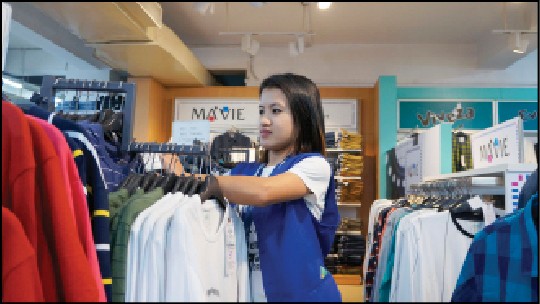Obangsenla Jamir. (Morung Photo)

Obangsenla Jamir shares about her life as a PwD in Nagaland
Kanili Kiho
Dimapur | January 30
Obangsenla Jamir (25) is busy doing her laundry on a Sunday. She was born with a condition on her right leg that makes it difficult for her to wear shoes, walk smoothly, stand for long hours or lift heavy weights. But she does not let that get in her way.
A sales executive at Vishal Mega Mart, Dimapur, she was selected through a recruitment process initiated by a Non Governmental Organisation (NGO).
“My childhood was beautiful, with lots of freedom and love,” she says while recalling the years she grew up with her family of four siblings and parents in Chümoukedima. What shines through her is the resilience and independence she evokes.
Few stories of Persons with Disabilities (PwDs) are recognized as stories of valour in a society that provides little by way of sensitivity to their struggles and wins.
When queried about her studies, she gushes, “I wanted to be a teacher, but I flunked high school, so I left it.” There was laughter and honesty in the air.
She is a dreamer and a realist. Asen, as her loved ones call her, also dreamed to become a nurse. But it was cut short, owing to her parents’ concerns for her well being. Instead, she took up tailoring class funded by the Government for six months. She then took up training as a beautician.
Upon her completion, Asen started training new students. Then she started practicing at a beauty salon. That did not quite quench her passion. She took up another private training course.
Living with her younger brother in a rented place at present, she recalls her parents telling her to stay at home where she grew up. But she had other ideas.
“It is my responsibility now to look after myself.”
Even on her day off, she freelances at a beauty salon. “Those days to laze around are over,” she reckons.
For her though, her struggles are not as insurmountable as many other persons living with disabilities in Nagaland that has little infrastructure to make public spaces accessible. “I admit I am blessed, where I do not need a wheelchair or any crutches,” Asen notes.
Rupam Sharma, store manager of the Mart, informs that Asen has been assigned the first floor, where she has easy access to the washroom, and does not have to take long stairs. “Some day when we get a new building, we plan on building ramps and lifts,” Sharma adds.
“She is efficient, and we don’t let her do all the heavy lifting,” another colleague chips in.
“I am happy here,” Asen smiles, as she stacks clothes, one on top of another, with great care. Some days call for extended shifts starting from 7:30 am to 7:30 in the evening, she says, but is quick to add, “I love my job. I can be myself and work with ease.”
On the daily plights of PwDs, she says, while waiting in long queues, for instance, giving PwDs a green signal would be a relief.
“Inclusivity for every citizen is necessary for a society to be happy,” Asen observes.
A society where barriers are removed and PwDs are empowered to participate fully in social life—that is an urgent task that Naga society needs to take up. To achieve progress and development for all, inclusivity and accessibility is the need of the hour.
In the meantime though, Asen is making the most of the world she was born into.






